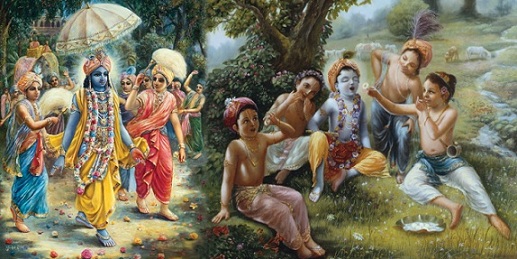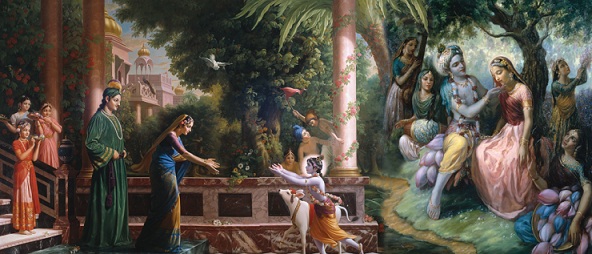
Devotees related to Lord Krishna as servants (left) fan Him with camaras as He enters Dwarka, His capital city. Right: In the srimad-Bhagavatam (10.12.11) Sukadeva Gosvami has observed, “The cowherd boys, having accumulated the results of pious activities for many lives, were able to associate in this way with the Supreme Personality of Godhead. How can one explain their great fortune?”
Only in our relationship with Krishna can we achieve the full satisfaction that escapes us in the temporary things of this world.
The Concept of rasa is pivotal to understanding Gaudiya Vaisnava philosophy, but it is elusive and often misunderstood. Srila Prabhupada followed the example of his guru, Srila Bhaktisiddhanta Sarasvati Thakura, and translated this Sanskrit term (a noun) as “mellow.” In American slang, mellow is an adjective meaning “laid back” or “relaxed.” Both acaryas use it as a noun, perhaps drawing on the word’s standard definition as “soft, sweet, and fullflavored from ripeness, as fruit.” With this understanding, a more functional (albeit less poetic) translation of rasa – and one Srila Prabhupada also used – is “taste.” Although the overtones of sweetness and liquidity are thus lost, in the interest of clarity I will use the term taste rather than mellow throughout most of this article.
By taste we do not indicate merely the flavor of food, but taste in the broadest sense of the word. Rasa is the pleasure we derive from an experience or relationship. As such, it is the impetus for everything we do; in all our endeavors, we act out of the desire to relish a particular rasa. In the mundane world, rasa is experienced both physically and socially. Our five senses elicit rasa by coming in contact with desirable objects. For example, I can experience a certain taste by eating a juicy peach, by looking at the full moon rising over Niagara Falls, or by scratching the warm body of a baby calf. Each of these activities produces a distinctive feeling and provides a unique type of pleasure. These feelings exemplify rasa on the physical level.
We also experience rasa through relationships. By conversing with an old friend or helping teach my young child to walk, I also “taste” something. Notice, however, that the experience varies from one relationship to another. I might describe myself as happy in both cases, but it’s not the same kind of happiness. This kind of rasa can be considered social, in that it involves interactions with other people rather than merely with objects. Of course, the physical pleasures described in the last paragraph may also evoke social rasa (the moon might remind me of camping with my family as a child), and social pleasures may also involve physical rasa (I might enjoy the sensation of holding my child’s hand while she walks), but one dimension or the other usually characterizes our experience more strongly.
The Source of Rasas
What is the source of these various rasas, and of our incessant desire to taste them? Vaisnava philosophy holds that the physical and social rasas of this world are merely reflections of the original rasas of the transcendental realm, the pursuit of which is the natural proclivity of the soul. And what is the object from which (or, more accurately, whom) we elicit this sublimely pleasurable taste? It is Sri Krishna , the Supreme Personality of Godhead and the akhila rasamrta murti – the embodiment of all wonderful ambrosial rasas. By taking a closer look at the process of relishing spiritual rasa centered on Krishna , we will be able to more clearly understand how mundane rasa operates and how it falls short of its perfect original counterpart.
As living beings, we are dependent and incomplete emanations from Krishna , the perfectly independent and eternally complete origin of everything. Like Him, we are inherently pleasure-seeking, but, unlike Him, we are not selfsatisfied, and our only happiness lies in maintaining our connection with Him. And, in our natural state, we are indeed able to derive unending spiritual rasa by engaging in loving exchanges with the Lord. Of course, there are many flavors of this rasa, and no two living entities enjoy quite the same blend. Each of us has an eternal relationship with Krishna in which we enjoy a particular taste. We may be in an inactive, neutral relationship with Him, or we may be His servant, friend, parent, or lover. Within each of these basic designations, further variety is introduced through seven kinds of interaction one may have with the Lord, in which one can experience laughter, astonishment, chivalry, lamentation, anger, fear, dread, or some combination of these. As a result, rasa comes in infinite flavors. (It is important to note the inclusion of supposedly negative emotions in the above list. In the absolute world, even these give pleasure rather than pain.)
So much for our natural situation in the kingdom of God. Down here, our innate propensity to seek pleasure through tasting rasa is misdirected. Without Krishna in the picture, we turn to material objects and mundane relationships as independent sources of happiness. The process, however, remains the same. Bhaktivinoda Thakura gives the example of eating a rasgulla, a popular Bengali sweet. He explains that the rasgulla takes the place of Krishna as the object we are depending on to find pleasure. Just as living beings in the spiritual world elicit various tastes from Krishna by serving Him in different relationships and moods, we elicit various forms of pleasure from the rasgulla by using our different senses: With our eyes we enjoy its white roundness, with our nose we enjoy its rosy scent, with our fingers we enjoy its soft squishiness, and with our tongue we enjoy its scrumptious taste. The same applies for social rasa. When we find pleasure through everyday interactions with friends and family members, we are using them as substitutes for Krishna .
Corrupted Rasa
At this point, one may wonder how it is possible for us to derive any kind of rasa from matter or other tiny living entities. It is one thing to get pleasure from Krishna , the complete whole and original embodiment of all rasas, but what can these inferior replacements offer? On their own, nothing. Nevertheless, out of His kindness, Krishna imbues them with a tiny portion of His energy – His illusory external energy – so that we fallen souls can find, in some small degree and in a distorted form, that which we abandoned the spiritual world for in search of pleasure without Him.

Nanda Maharaja and Yasoda-mayi (left) serve Lord Krishna as His parents, and the Lord acts like an ordinary, dependent child. Right: In the mood of amorous love, Krishna enjoys the most intimate oving exchanges with Srimati Radharani and Her gopi friends
As might be expected, however, given our original spiritual identity, the corrupted and indirect rasa we taste by thus lording it over matter is nowhere near as satisfying as the genuine rasa that comes from serving the Lord. Indeed, that is the lesson to be learned in this world. Any pleasure we derive from mundane objects and relationships is only the insubstantial shadow of what Krishna can offer us. We simply have to let Him back into the picture and reawaken our dormant loving relationship with Him. Once we do, even our interactions with objects and other people will become spiritualized, and we’ll enjoy an unending cascade of flavorful mellows of every variety. As the Vedic aphorism states, raso vai sah, rasam hy evayam labdhvanandi bhavati: “He Himself is rasa. And certainly one who achieves this rasa becomes anandi, filled with bliss.” (Taittiriya Upanisad 2.7.1)
Navina Syama Dasa is a disciple of His Holiness Bhakti Caru Swami. His family lives in ISKCON’s Radha Kalachandji community in Dallas, where he is an attorney with the United States Department of Labor and where his daughter attends TKG Academy
